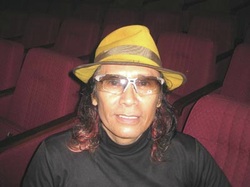
| Sat, 09/05/2009 12:44 PM | Life
In silver sneakers, pink trousers and yellow hat, Leo Kristi seems to be saying loud and clear that he’s not going to let age take the shine off his persona.
Saying he forgot he just celebrated his 60th birthday, this noted troubadour — he’s made his name as a traveling poet–musician — feels he’s still young enough to spread the spirit of freedom among the people he meets during his journeys.
“Actually, I thought I was still 50,” says Leo, who celebrated his birthday on Aug. 8. “But then my friends reminded me: ‘Mas, you’re already 60!’,” he laughs.
At 60, the country’s living folk music legend says he’s more passionate about life than ever, including in continuing his work of collecting stories from across the archipelago, blending them with rhythm and sharing them on stage.
“Every part of Indonesia has its own uniqueness; all I want is to share the art from each place with people [from other places],” says Leo, whose real name is Leo Imam Sukardi.
The stories he’s spent his life sharing through his music are about pretty much anything that depicts reality, but they have one thing in common: They reflect the spirit of Indonesia. And this is what has made him stand out among other musicians in the country.
Although similar nationalist musicians like Iwan Fals, Doel Sumbang and the late Gombloh might have gained more popularity, Leo has won cult status; he has many loyal fans scattered across the country, with many of them founding their own music groups influenced by Leo’s style.
But then how can a musician like Leo who seldom puts out records (his last album, Tembang Lestari, was released in 1995) maintain such a solid fan base? Simply, Leo travels a lot, meets people and interacts with them, which means he builds a certain attachment among his listeners.
“In Bali, there’s a group of young men who used to work in Java, where they used to listen to my songs all the time. They came to love the songs and when they returned [to Bali], they founded a group that plays similar music to mine,” Leo says.
“I saw their hard work, so I decided to take some time to train them. I share with them ideas about how to stimulate our minds so we can create songs.”
From his story, it’s clear that the Surabaya-born musician builds loyalty by avoiding any sense of a “superstar” persona.
“Fans for me are like a brotherhood,” he says. “There are no boundaries between us; we share the same fondness for songs about society, culture and politics.”
Leo’s fans, who come together in one big family called Komunitas Leo Kristi (Leo Kristi’s Community), or LKers for short, are a mix of all ages, with many of them young people who are actively involved in holding arts events dedicated to Leo.
As one of the members, Kurnia Effendi, said at the opening of one of the LKers’ events, “Don’t be surprised to learn some of us are from the younger generation and didn’t witness Leo’s glory [in the past]. These young people sing Leo’s songs better than their own fathers.
“This has proved that Leo’s songs are universal and cross generations.”
Leo has been professionally playing music now for more than half his life. His decision to become a troubadour is rooted in his childhood, when he had exposure to music inside his home and was finding his freedom outside the home.
“I just loved to leave home, going to places with my bicycle or scooter,” says the father of Panji, 14, and Rayu, 11. “For me, creativity means going out. Perhaps that what made me love to travel while making music.”
As a boy in Surabaya, Leo, a Muslim, attended a Christian elementary school where he joined a choir that traveled to churches to sing. In junior high school, his love of music grew after his father bought him a guitar and sent him to musician Tino Kerdjik to study. He also studied vocal techniques under Nuri Hidayat and John Topan, and took a guitar lesson with Poei Sing Gwan dan Oei Siok Gwan.
By the time he was in high school, Leo was the member of a band called Jak Lloyd, which gave him the chance to travel around the country. During this time, he witnessed the gloomy lives of the poor and started to write songs with nationalist and humanist sentiments.
Leo’s musical journey moved further in 1969, when he established a band called Lemon Trees with musician Gombloh, who was his friend at the Architecture School at the Surabaya Technology Institute. Leo later left the band to launch his solo music career, moving from one place to another to sing, including in restaurants, the Goethe Institute and Indonesia-America Foundation (LIA). In 1975, he released his first album, Nyanyian Fajar (The Song of The Dawn); over the next 20 years, nine more albums followed.
Fans have been kept waiting 14 years now for his new album but Leo says he can’t promise it will be out soon.
“The songs are all ready, but I just haven’t found a win–win solution with the producer,” Leo says, without wanting to go into detail. For sure, he adds, “the music industry has changed a lot now, but on the other hand we just can’t accept it just like that. There are things to be adjusted.”
But although Leo can’t promise another album, he’s preparing something else for his fans: an art book that comprises a collection of his songs’ lyrics, poems, stories, paintings and photographs.
And when will that be ready?
Leo just smiles. “Soon.”
http://www.thejakartapost.com/news/2009/09/05/leo-kristi-his-journey-continues-with-spirit.html
